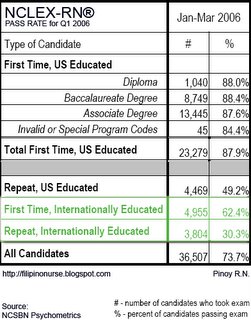There’s a saying that goes, “If it’s too good to be true, it probably is!” It pays to remember this saying when dealing with nurse staffing and recruitment agencies.
With the growing demand for nurses worldwide, nurse staffing and recruitment agencies have proliferated both here and abroad.
Nurse recruiters have been aggressively inviting nurses to work overseas, especially in the United States, with promises of free housing, insurance, medical and dental benefits, immigration assistance, free review and application for the CGFNS and NCLEX-RN exams, and sign-on bonuses.
Such attractive offers prove irresistible for Filipino nurses with the meagre salary and sub-standard working conditions they are currently in. However, caution must be exercised before signing up with agencies.
Complaints have been piling up in several internet nursing forums about nurse staffing and recruitment agencies not living up to their promises or are misrepresenting information.
In New York City for example, White Glove Agency is reported to be putting nine to ten people in one studio apartment with only one bathroom, one very small kitchen, and no heat in the winter.
White Glove Agency was contacted to comment on the allegation. No reply has been received as of this writing.
Another nurse recruiter, VisionQwest is reported to be misrepresenting its company as a direct hire employer.
Other complaints inlcude not informing the nurse where he or she will be assigned, giving salary rates that are way below the prevailing rates in the area, making nurses sign contracts even without a job order, and is recruiting in the Philippines without a license from the Philippine Overseas Employment Administration (POEA).
Contacted for comment, VisionQwest President & CEO Michael L. Lodge explains:
Regarding being a direct employer. “That is true we are. The contract is with VisionQwest Healthcare Services, their paycheck and benefits come from VisionQwest Healthcare Services, their direction to what facility they will be in comes from VisionQwest Healthcare Services.”
Regarding pay rates and schedules. “There is no way at the time we hire a nurse in the Philippines to the time they get to the United States where we can tell them exactly which facility they will be in. The need in our facilities change on a daily basis.”
Regarding the POEA issues. “There seems to be a good amount of misunderstanding on the role of the POEA. If we were an agency that were sending nurses to another country on a work visa for an assignement, then we would have to go through the POEA. However, since we are the direct employer, we are signing their petition for US immigrant visa, the POEA is not involved.”
Read the full statement of VisionQwest President and CEO Michael L. Lodge here.
In an effort to safeguard the public from illegal recruitment, the Philippine Overseas Employment Administration (POEA) came up with the following guidelines in dealing with recruiters:
- Do not apply at recruitment agencies not licensed by POEA.
- Do not deal with licensed agencies without job orders.
- Do not deal with any person who is not an authorized representative of a licensed agency.
- Do not transact business outside the registered address of the agency. If recruitment is conducted in the province, check if the agency has a provincial recruitment authority.
- Do not pay more than the allowed placement fee. It should be equivalent to one month salary, exclusive of documentation and processing costs.
- Do not pay any placement fee unless you have a valid employment contract and an official receipt.
- Do not be enticed by ads or brochures requiring you to reply to a Post Office (P.O.) Box, and to enclose payment for processing of papers.
- Do not deal with training centers and travel agencies, which promise overseas employment.
- Do not accept a tourist visa.
- Do not deal with fixers.
Concerned with the growing number of complaints, an American nurse who goes by the username suzanne4 in an international internet nursing forum advices foreign nurses to scrutinize their employment contracts before signing it.
“There is no such thing as a free green card. The money for it will be coming from your pocket, not the agencies. In most cases, there is about $5 per hour taken from you to cover the expenses. This works out to about $20,000 over two years. Expenses are about $4,000. You do the math.”
She adds:
“Pay attention to what the cancellation fee is. If for some reason that you would need to leave your contract early, or the facility cancels you, you will be responsible for paying that fee. The document that you sign is a legally binding contract. And some contracts can be as high as $15,000 to $20,000. If your recruiter makes a promise, but it is not written into your contract, then it doesn't exist. It must be in writing and signed off by the management of the agency. And oral promise will not mean anything, especially if your recruiter is no longer working for that agency later on.”
On the other hand, suzanne4 points out that:
“There are some excellent agencies out there that do what they say that they are going to do, and do not take advantage of anyone.”
Related News:
Nurses File Class Suit Against Sentosa Recruitment Agency
Over 100 Pinoy nurses exploited in UK private nursing homes







